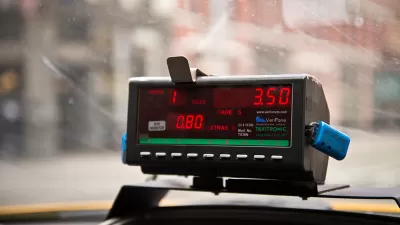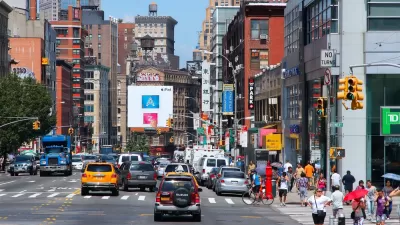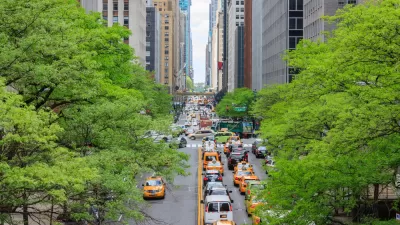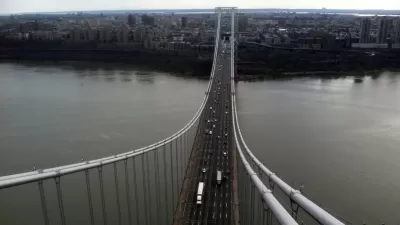New York City's ailing taxi industry is fighting what they call a "suicide surcharge," a new $2.50 fee they will be forced to charge riders below 95th Street in Manhattan. Eight drivers have already taken their lives as their business suffers.

Last year, a second attempt to apply congestion or cordon area pricing in New York City initially called for an $11.52 toll for passenger vehicles and $25.34 for trucks charged weekdays from 6 AM to 8 PM to enter Manhattan south of 60th Street and new "for-hire vehicle fees" that would apply to taxis and transportation network companies. In the end, only the latter survived.
"The new fees were supposed to help fix New York City’s ailing subway by raising more than $1 million a day from those who could afford to take taxis and Ubers in Manhattan," reports Winnie Hu for The New York Times.
“Transit riders, individual taxpayers and business are all contributing toward the cost of modernizing our transit system and it is only fair that the taxi industry and their customers do the same,” said Kathryn S. Wylde, president of the Partnership for New York City, a group of influential business leaders that supports the fee.
Taxi drivers fear the new charge will make a bad situation worse. Owners of medallions have seen them plummet in value due to the onslaught of competition from transportation network companies like Uber and Lyft. Last month, the Times transit reporter, Emma G. Fitzsimmons, reported on the eight suicides, largely of immigrant drivers in their 50s and 60s, attributed to financial stress.
The surcharges, now called a "congestion pricing fee," $2.75 for Ubers and Lyfts; $2.50 for yellow taxis; and 75 cents for carpool services like Via and UberPool, were scheduled to take effect on Jan. 1, but first they must survive a lawsuit filed by cab drivers and medallion owners last month.
“This law cannot survive even the most generous level of court scrutiny because there is no rational basis for blaming medallion taxicabs for increased congestion,” said attorney Brett Berman for the plaintiffs, reported Danielle Furfaro on Dec. 19 for The New York Post.
"At Thursday’s [Jan. 17] hearing, a judge continued the suspension of the fee until the next hearing, scheduled for Jan. 31," adds Hu.
Unlike the taxi industry, Uber and two other ride-app services, Lyft and Via, have supported the fees as a step toward addressing congestion and transit challenges in the city.
“In order to truly address these issues, it’s imperative that all vehicles, including personal and commercial, are included in this effort,” said Campbell Matthews, a spokeswoman for Lyft.
Hu does a thorough job of presenting both sides of the debate. Transportation expert Bruce Schaller, whose firm released a study in December 2017 that found that ride-hailing contributes to congestion and transit losses, admitted the fee was unlikely to mitigate congestion but argued that the revenue was vital to repairing the subway.
Economist Joe Cortright argues that it is unwise to proceed with ride-hailing fees alone, as do other critics in a related post.
On Jan. 15, Gov. Cuomo announced in his state-of-the-state address [(pdf), click on Contents: "Part 2. Building 21st Century Infrastructure...Proposal: Reduce Traffic Congestion in NYC and Fund the MTA"] that he would try again to authorized cordon tolling of private passenger vehicles and trucks in midtown.
"Now that both the state Assembly and the state Senate are controlled by Democrats, he’s confident that it will finally pass," reports Ameena Walker for Curbed New York on Jan. 16.
Related in Planetizen:
-
Ride-Hailing fees likely to disproportionately impact women, Nov. 13, 2018
-
Road Pricing Shouldn't Stop at Ride Hailing Services, March 8, 2018
-
Congestion Pricing—Only for Ride-Hailing Services, January 5, 2018
FULL STORY: ‘Suicide Surcharge’ or Crucial Fee to Fix the Subway? Taxi Drivers Brace for Battle Over $2.50 Charge

Alabama: Trump Terminates Settlements for Black Communities Harmed By Raw Sewage
Trump deemed the landmark civil rights agreement “illegal DEI and environmental justice policy.”

Study: Maui’s Plan to Convert Vacation Rentals to Long-Term Housing Could Cause Nearly $1 Billion Economic Loss
The plan would reduce visitor accommodation by 25% resulting in 1,900 jobs lost.

Planetizen Federal Action Tracker
A weekly monitor of how Trump’s orders and actions are impacting planners and planning in America.

Wind Energy on the Rise Despite Federal Policy Reversal
The Trump administration is revoking federal support for renewable energy, but demand for new projects continues unabated.

Passengers Flock to Caltrain After Electrification
The new electric trains are running faster and more reliably, leading to strong ridership growth on the Bay Area rail system.

Texas Churches Rally Behind ‘Yes in God’s Back Yard’ Legislation
Religious leaders want the state to reduce zoning regulations to streamline leasing church-owned land to housing developers.
Urban Design for Planners 1: Software Tools
This six-course series explores essential urban design concepts using open source software and equips planners with the tools they need to participate fully in the urban design process.
Planning for Universal Design
Learn the tools for implementing Universal Design in planning regulations.
Caltrans
Smith Gee Studio
Institute for Housing and Urban Development Studies (IHS)
City of Grandview
Harvard GSD Executive Education
Toledo-Lucas County Plan Commissions
Salt Lake City
NYU Wagner Graduate School of Public Service





























